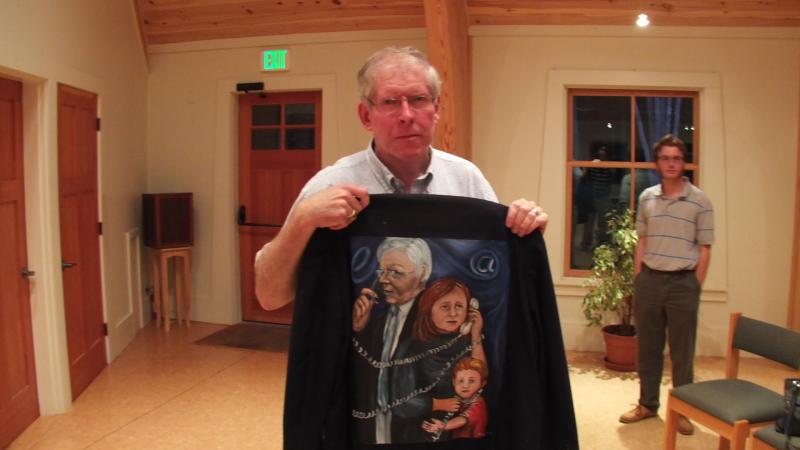Cancer survivor advocates for more patient involvement with physicians
 E-PATIENT DAVE displays a jacket specially designed for people battling a terminal disease. Dave deBronkart received the jacket from a women whose spouse died of cancer. deBronkart wears the jacket during his presentations around the world advocating for patients to become more active in their own healthcare. deBronkart spoke on July 17 as the guest speaker at the Boothbay Region Wellness Foundation Third Thursday lecture series. BILL PEARSON/Boothbay Register
E-PATIENT DAVE displays a jacket specially designed for people battling a terminal disease. Dave deBronkart received the jacket from a women whose spouse died of cancer. deBronkart wears the jacket during his presentations around the world advocating for patients to become more active in their own healthcare. deBronkart spoke on July 17 as the guest speaker at the Boothbay Region Wellness Foundation Third Thursday lecture series. BILL PEARSON/Boothbay Register
 E-PATIENT DAVE displays a jacket specially designed for people battling a terminal disease. Dave deBronkart received the jacket from a women whose spouse died of cancer. deBronkart wears the jacket during his presentations around the world advocating for patients to become more active in their own healthcare. deBronkart spoke on July 17 as the guest speaker at the Boothbay Region Wellness Foundation Third Thursday lecture series. BILL PEARSON/Boothbay Register
E-PATIENT DAVE displays a jacket specially designed for people battling a terminal disease. Dave deBronkart received the jacket from a women whose spouse died of cancer. deBronkart wears the jacket during his presentations around the world advocating for patients to become more active in their own healthcare. deBronkart spoke on July 17 as the guest speaker at the Boothbay Region Wellness Foundation Third Thursday lecture series. BILL PEARSON/Boothbay Register
Dave deBronkart has a simple message: “I beat cancer and so can you.” In 2007, he was diagnosed with kidney cancer. While researching the disease, he found one study showed that over 50 percent of patients died within 24 months of contracting his form of cancer: stage IV, grade four metastatic cell carcinoma.
deBronkart credits his being an “engaged patient” as playing a critical role in his survival. deBronkart has written about his experience in a blog, a book, testified in a congressional hearing, and travels around the world promoting patients taking a greater role in their healthcare.
deBronkart, also known as “e-patient Dave,” spoke in Boothbay Harbor on July 17 at St. Columba’s Episcopal Church as the guest speaker for the Boothbay Region Health & Wellness Foundation’s Third Thursday lecture series. deBronkart told the audience of about two dozen that the patient’s role in healthcare is vital. According to deBronkart, medical information is so voluminous and in constant flux that no one source can possibly know everything.
“To me, it’s just being a responsible patient,” he said. “You learn all that you can so you know what your options are. The information is definitely out there. It’s all about knowing where to look.”
deBronkart urged the audience to seek out information and not depend solely on their primary care physician. deBronkart used his own case as an example for being an “engaged patient.” He said the patient’s role in the information age should be one who regularly checks their medical record for errors, plans medical appointments to optimize time with a physician, and research how other patients successfully overcomes illness.
deBronkart believes his penchant for emailing his doctor an agenda prior to an examination benefited his quality of healthcare. It was during a routine visit that led to his kidney cancer diagnosis. He emailed the doctor about a problem with his shoulder. He complained about his arms having a limited range of motion. A cat scan revealed what caused deBronkart’s shoulder ailment and something else.
“Your shoulder is going to be fine, but we found an unidentified spot in your lungs,” deBronkart’s physician Dr. Daniel Sands said.
The shoulder problem was caused by a torn rotator cuff, the spot was kidney cancer. Fortunately for deBronkart, Dr. Sands was part of a movement towards encouraging patients to take an active role in their healthcare. He directed deBronkart to the Association of Cancer Online Resources website.
ACOR, now known as Smart Patients, is an online community of patients and caregivers who specialize in sharing information about one disease. deBronkart wasted no time in posting a message on the ACOR site. Within two hours, he received several responses advising him how to treat his cancer.
ACOR members told him go to a hospital that treats a large number of kidney cancer patients, and use a new drug called Interleukin-2 before any other. The drug, which purges the body of cancer, has a common side effect, according to deBronkart: It results in the death of many users.
“It sure worked for me,” deBronkart said. “When it came time for surgery — my body once full of cancer — was mostly gone. The surgeon didn’t even have to cut into my lungs to remove the remaining cancer.”
The lecture’s audience included several members involved in the medical field. Dr. Stephen Cook recalled an interaction with a thoroughly prepared patient in the emergency room. The patient presented Cook with a three-ring binder of his medical history.
“That was an important moment for me. Patients who travel can have a complex medical history. When a patient comes in with information this saves a great deal of time. It helps in finding an efficient way in knowing how to treat them,” Cook said. “With some basic information, it allows for safer decisions to made in an more efficient manner.”
Foundation board member Valerie Young thought “e-patient Dave” conveyed an important message to the public. She said the board has advocated that patients become more proactive in their healthcare.
“It’s exactly the message the foundation has been trying to spread. Patients need to be more engaged,” Young said. “He had a compelling message, and the two hours really flew right by.”
deBronkart described his journey from being diagnosed with terminal cancer to becoming cancer-free like a pin ball game. “When I heard about the grim prospects, it was like ‘game over.’ But now it’s like a ‘free game’.”
deBronkart plans on delivering the same talk he gave in Boothbay Harbor to audiences in Australia, Switzerland and Sweden later this year.
Event Date
Address
United States























